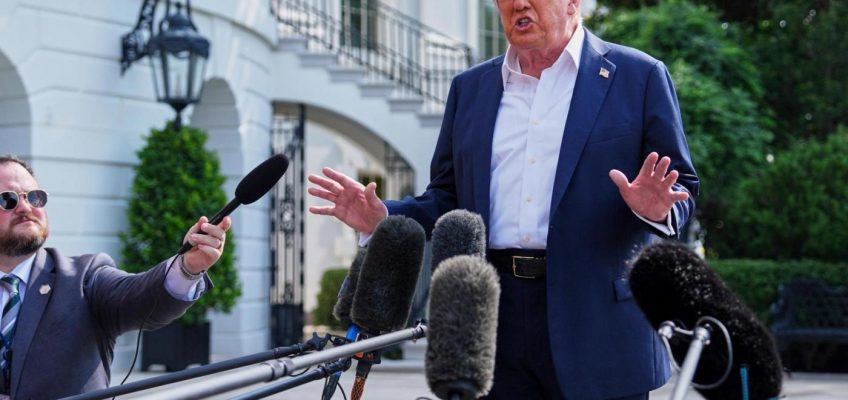WASHINGTON (AP) — The United States is selling weapons to its NATO allies in Europe so they can provide them to Ukraine as it struggles to fend off a recent escalation in Russia’s drone and missile attacks, President Donald Trump and his chief diplomat said.
“We’re sending weapons to NATO, and NATO is paying for those weapons, 100%,” Trump said in an interview with NBC late Thursday. “So what we’re doing is, the weapons that are going out are going to NATO, and then NATO is going to be giving those weapons (to Ukraine), and NATO is paying for those weapons.”
Secretary of State Marco Rubio said Friday that some of the U.S.-made weapons that Ukraine is seeking are deployed with NATO allies in Europe. Those weapons could be transferred to Ukraine, with European countries buying replacements from the U.S., he said.
“It’s a lot faster to move something, for example, from Germany to Ukraine than it is to order it from a (U.S.) factory and get it there,” Rubio told reporters during a visit to Kuala Lumpur, Malaysia.
U.S. Secretary of State Marco Rubio gives a media briefing during the ASEAN Foreign Ministers’ Meeting at the Convention Centre in Kuala Lumpur Friday, July 11, 2025. (Mandel Ngan/Pool Photo via AP)
Ukraine badly needs more U.S.-made Patriot air defense systems to stop Russian ballistic and cruise missiles. Trump’s Republican administration has given conflicting signals about its readiness to provide more vital military aid to Ukraine for its more than three years of fighting Russia’s invasion.
After a pause in some weapons shipments, Trump said he would keep sending defensive weapons to Ukraine. U.S. officials said this week that 155 mm munitions and precision-guided rockets were on their way.
Ukraine is seeking more coveted Patriot air defense systems
Germany, Spain and other European countries possess Patriot missile systems, and some have placed orders for more, Rubio said.
The U.S. is encouraging its NATO allies “to provide those weapons, systems, the defensive systems that Ukraine seeks … since they have them in their stocks, and then we can enter into financial agreements with them, with us, where they can purchase the replacements,” Rubio said.
Ukraine has asked foreign countries to supply it with an additional 10 Patriot systems and missiles, Ukrainian President Volodymyr Zelenskyy said Thursday. Germany is ready to provide two systems, and Norway has agreed to supply one, he said.
Russia has recently sought to overwhelm Ukraine’s air defenses by launching major aerial attacks. Earlier this week, Russia fired more than 700 attack and decoy drones at Ukraine, topping previous nightly barrages for the third time in two weeks.
At the same time, Russia’s bigger army is pressing hard on parts of the 1,000-kilometer (620-mile) front line, where thousands of soldiers on both sides have died since the Kremlin ordered the invasion of neighboring Ukraine in February 2022.
Impact of the latest Russian attacks
In the latest attacks, a Russian drone barrage targeted the center of Kharkiv just before dawn Friday, injuring nine people and damaging a maternity hospital in Ukraine’s second-largest city, officials said.
Karyna Holf, 25, stands in her apartment which was damaged by a Russian drone strike in Kyiv, Ukraine, on Thursday, July 10, 2025. (AP Photo/Evgeniy Maloletka)
Mothers with newborns were being evacuated to a different medical facility, Kharkiv Mayor Ihor Terekhov wrote on Telegram. He didn’t say whether anyone at the hospital was among the injured.
Also, a daytime drone attack on the southern city of Odesa injured nine people.
“There is no silence in Ukraine,” Zelenskyy said after the Kharkiv bombardment. Kyiv, the Ukrainian capital, has endured repeated and intensifying drone attacks in recent weeks, as have many other regions of the country, mostly at night.
June brought the highest monthly civilian casualties of the past three years, with 232 people killed and 1,343 wounded, the U.N. human rights mission in Ukraine said Thursday. Russia launched 10 times more drones and missiles in June than in the same month last year, it said.
Other weapons sought by Ukraine
Zelenskyy urged Ukraine’s Western partners to quickly enact pledges of help they made at an international meeting in Rome on Thursday.
Trump plans to hike tariffs on Canadian goods to 35%
Rubio and Wang stress cooperation after talks in Malaysia as US-China tensions simmer
State Department is firing over 1,300 employees under Trump administration plan
Trump plans to tour Texas flood damage as the scope of the disaster tests his pledge to shutter FEMA
The newest way to influence Trump: Nominate him for the Nobel Peace Prize
Ukraine also needs more interceptor drones to bring down Russian-made Shahed drones, he said, adding Moscow plans to manufacture up to 1,000 drones a day.
Zelenskyy said Thursday that talks with Trump have been “very constructive.”
After repeated Russian drone and missile onslaughts in Kyiv, authorities announced Friday they are establishing a comprehensive drone interception system under a project called Clear Sky.
The project includes a $6.2 million investment in interceptor drones, operator training, and new mobile response units, according to the head of the Kyiv Military Administration.
Zelenskyy appealed to foreign partners to help Ukraine accelerate the production of the newly developed interceptor drones, which have proved successful against Shaheds.
“We found a solution, as a country, scientists and engineers found a solution. That’s the key,” he said. “We need financing. And then, we will intercept.”
AP Diplomatic Writer Matthew Lee contributed from Kuala Lumpur, Malaysia.




